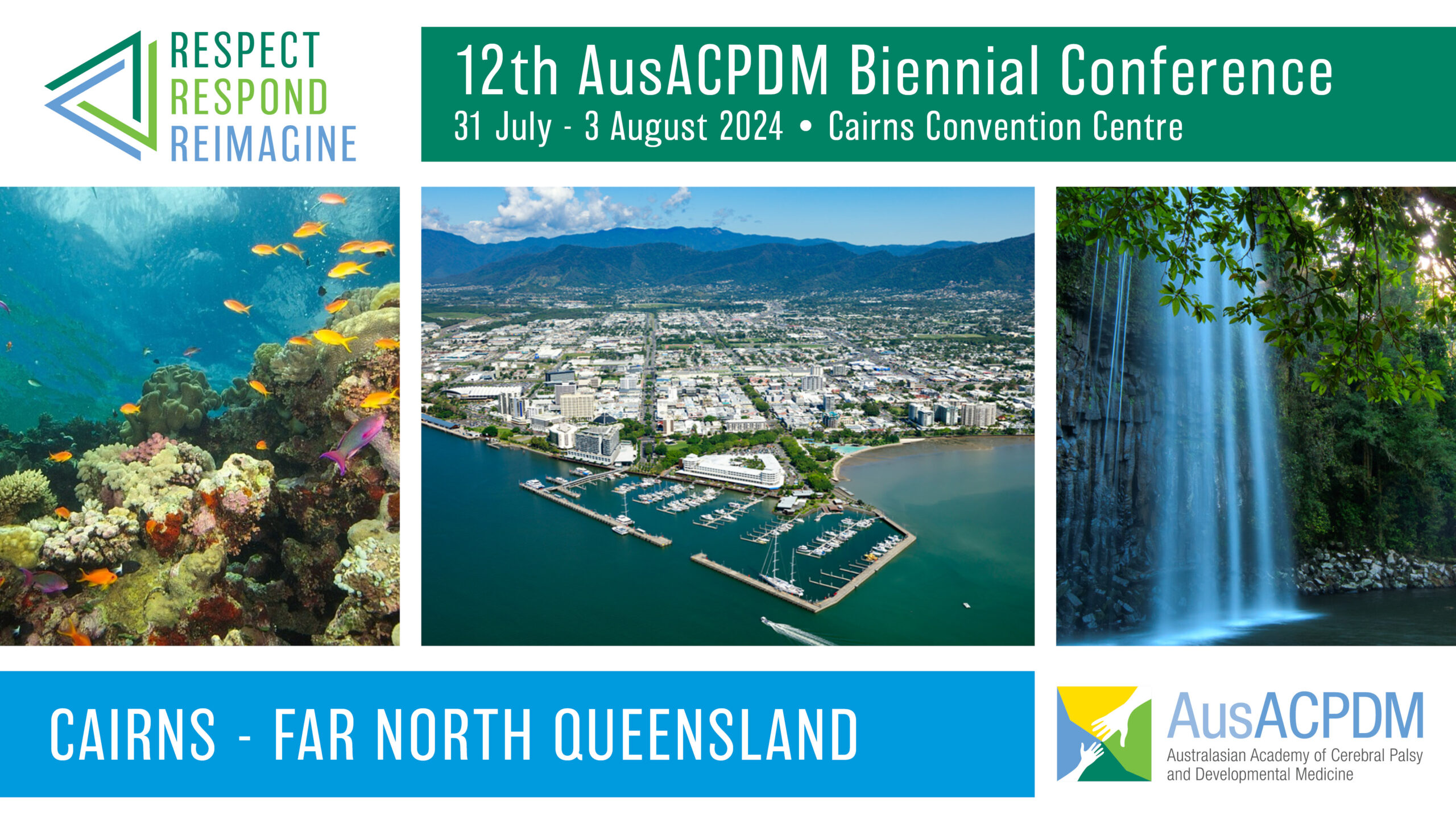
AusACPDM Pre-Conference workshops announced!
Four pre-confernece workshops have now been announced and are open for registration. Don’t miss out as places are limited. For updates, visit https://ausacpdm2024.com.au/program/pre-conference-workshops.html
Implementing early intervention for infants (0-2 years) at risk of adverse neurodevelopmental outcomes
Tuesday 30th July, 8:30am – 4:30pm
Presenters: Prof Roslyn Boyd, Prof Stacey Dusing, Dr Sue Greaves, Prof Andrea Guzzetta, Dr Cathy Morgan, Prof Iona Novak, Prof Alicia Spittle
This workshop is aimed at clinicians (allied health and medical) and parents of young children at high risk of adverse neurodevelopmental outcomes. It will focus on the practical implementation of early intervention to improve a range of neurodevelopmental outcomes for at risk infants born preterm and/or with cerebral palsy or Cerebral Visual Impairment (CVI). The workshop will focus on key principles informing early intervention and the latest evidence-based trials conducted with infants with cerebral palsy and/or born preterm. Throughout the workshop there will be a strong focus on practical strategies using illustrative case studies and the use of assessments to inform the choice of intervention strategies that are most appropriate to individualise therapy.
The four targeted early intervention areas will include:
- Goals Activity Motor and Environmental Enrichment (GAME) for all infants at high risk of CP;
- Two upper limb therapy approaches for infants with or at high risk of unilateral CP (modified constraint-induced movement therapy – Baby-CIMT and bimanual therapy -Baby-BIM) in REACH;
- Early intervention for preterm infants – SPEEDI and TEDI-PREM;
- Assessment and intervention strategies for infants with Cerebral Visual Impairment (VISIBLE).
Promoting Wellbeing for children, young people and their families: A practical approach
Tuesday 30th July, 8:30am – 4:30pm
Presenters: Dr Giuliana Antolivich, Dr Jasneek Chawla, Dr Sue McCabe, Jacqui Barfoot, Grace Kirby, Assoc Prof Adrienne Harvey, Amy Hogan, Georgie Henry, Hannah Diviney
This workshop will explore and promote the importance of wellbeing for children and their families from early childhood through to adulthood. It will provide research updates and an evidence-based practice approach exploring pain, fatigue and sleep. The importance of good physical health, participation in physical activity and good mental health will be addressed. Participants will hear from panellists with lived experience and research and clinical experts in the fields of sleep, pain, fatigue, wellbeing and participation across childhood disability. The workshop aims to provide clinicians with a range of tips, tricks and tools that can be implemented in clinical practice.
Infinite Horizons: A Workshop for Everyone – Babies to Adults with Cerebral Palsy, Real People to AI Advancements
Wednesday 31st July, 8:30am – 1pm
Presenters:
- Australians with lived experience
- CP-ACHIEVE Team: Reddihough, Imms, Wallen, Morgan, Coghill, Shields
- DRIVE CP team: Novak, Boyd, Sakzewski, Bradford, Fahey, Morgan, Spittle
This workshop will provide participants with updates from the two current Centres for Research Excellence in Cerebral Palsy – CP-Achieve and DRIVE CP. Topics covered include:
- Powerful partnering with people with CP and family members in research (the real people)
- Artificial intelligence – diagnostic opportunities and challenges (the AI)
- Hot off the press – a selection of new CP research findings in brief.
- New studies – what’s coming your way and ways to get involved.
Working cross culturally in maternal and child health: walking the walk, not just talking the talk
Presenters:
- LEAP Team: Dr Kath Benfer, Ms Carly Luke, Ms Leeann Mick-Ramsamy, Ms Jesse-Lee Richards, Ms Martika Takken, Ms Ellena Oakes
- Strong Families Cohort: A/Prof Kym Rae, Ms Davina Smith, Prof Sandra Eades
- ENVISAGE First Peoples Team: Prof Laura Miller, Ms Rebecca Tamaariki, Prof Christine Imms
- A/Prof Sue Wolfenden
This workshop draws on the experiences of teams with extensive experience in First Nations and refugee/ migrant maternal and child health programs, from both service-delivery and research perspectives. A panel discussion will elucidate a toolkit for competent cross-cultural practice, including use of engaging words and effective communication, the role of culture in health beliefs and decision-making, exploring clinician attitudes and assumptions, considerations for culturally responsive models of care, and ensuring cultural safety.
